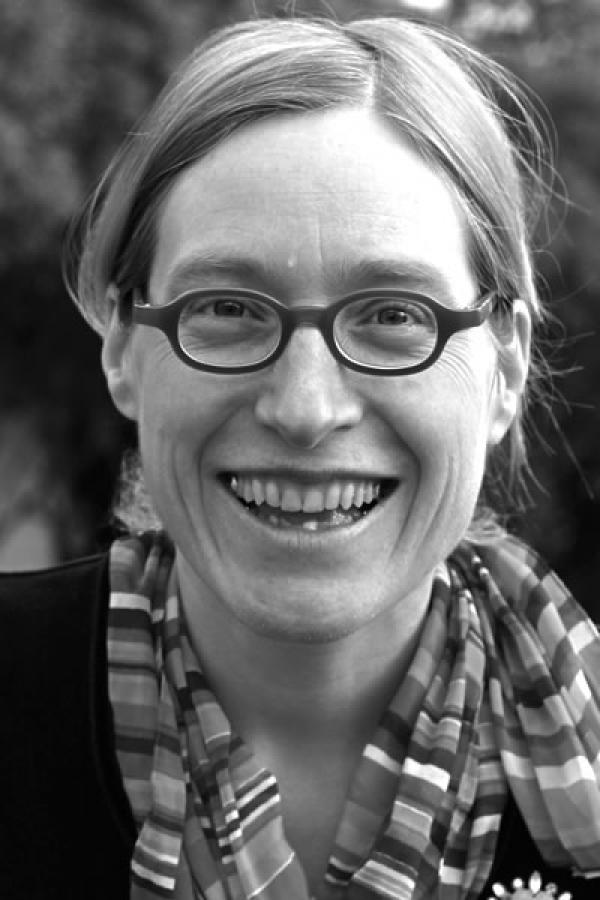Nona Caspers

Photo by Avery McGinn
Bio
Nona Caspers migrated to San Francisco from rural Minnesota. Her book of stories, Heavier Than Air, won the Grace Paley Prize in Short Fiction (AWP Award Series) and was an Editor's Choice in the New York Times Book Review. Caspers's stories have been widely published in literary journals and anthologies; in addition, she has received an Iowa Review Fiction Award, a Joseph Henry Jackson Literary Grant and Award, a Cooper Prize from the Ontario Review, and a Barbara Demming Memorial Grant and Award. She also has been a two-time runner up for the Missouri Review Editor's Prize. She is the author of The Blessed (Silverleaf Press) and another book of nonfiction prose is forthcoming in 2008, Book of One-Hundred Days, from Spuyten Duyvil Press. She is an Associate Professor at San Francisco State University.
Author's Statement
A student once said, "We are not here to see through each other but to see each other through. But maybe, if we can see into one another, we can help see each other through." Reading and writing help me see into people beyond familiar social reductions. I have notebooks of material about a woman who lives next to an alley and receives visits from the dead - and other notebooks full of someone called Joe, who is an amputee just home from Iraq, and Nora, a queer teenage girl who lives next door in rural somewhere (I think she is the Nora from the Heavier than Air stories, but I'm not sure). Every time I enter these worlds it's like stepping into a tone or color and I want to stay there longer and find out who these people are and what will happen next - how will they survive? How will they help each other survive? The fellowship gives me the encouragement and the means to spend more time in these worlds. I don't think I could live very happily without writing stories or playing with language, though sometimes I wish I could.
From the short story "Country Girls"
At the corner of our barn was my favorite chicken, favorite because it had a lopsided body and a patch of feathers missing on one side as if someone had plucked them, and because it followed me around when I was setting out my bones behind the house. Early on I had dressed the chicken in an old doll shirt and tatters of the pink collar still hung around its neck, just the sort of thing Cynthia would hate, but for some reason I didn't understand that.
"Cluck, cluck," I said, and pet the chicken. I squatted to look into the chicken's red eyes. "I love you," I said. The chicken jerked its head. "More than anything," I said. I picked it up and started walking toward the field; I had a vague notion that I would give the chicken to Cynthia, and that she would cure it. Or maybe I just wanted to show her how much the chicken loved me. At the bottom of the hill a toad scrambled under my foot and I took it to mean I was on my way to the right thing. The chicken pulsed under my arm but didn't put up a fuss - another sign.
I stood on the porch outside Cynthia's house. Between the screen and aluminum door a fly was trapped. I let the fly out. I could see into the kitchen; fabric laid out across the table, green with rose print. Aunt Katie came out of the back room in a big blue shirt, no pants. The shirt hung down to her knees; her legs were skinny but her knees were blubbery.
"You again," she said, picking the scissors off the table.
"Me," I said.
"How long you been here? You have a chicken for me today?"
I put the chicken on the porch and circled my fingers and thumb around my eye like a mask. "Hoo. Haa," I said.
She laughed, but it was more a laughing at. "You are a funny kid," she said. "Odd."
"Is Cynthia home yet?"
"No, she's not home. You need to get another hobby."
I sat down on the porch with my chicken. A car that looked familiar but that I hadn't noticed when I came up was in the driveway behind the shed. After a few minutes Auntie Katie opened the door wearing pants and yelled out, "If you're gonna sit there, Miss city pants, why don't you work."
"What do you want me to do?"
She pointed me toward a shovel that looked new on the porch and then toward the chicken coop.
The shed had a foot of straw and chicken poop on the floor and iron poles lying on it. I stacked the poles behind the shed and started shoveling the dirty straw into a wheelbarrow I found in the barn. The sun was coming in the door and warming my legs as I worked, and soon I could feel my sweat and then I could feel a shadow over me - someone standing in the doorway watching me. I shoveled for a while more slowly and then I went out.
She was sitting up against the coop chaining dandelions.
"I brought you a crazy chicken," I said, but she didn't answer. I sat in front of her. Something was different about her face, a bluish hue on her cheekbone.
"What happened to your face?" I asked.
"My mom."
"Why'd she hit you?"
Cynthia kept chaining. "The reason don't matter," she said. "She just gets mad and swats because she can't make things how she wants."
"What does she want?"
Cynthia finished off the chain and looped it over the chicken's head, which I think now must have been a bit of a concession. "She wants love," she said, looking at me.

